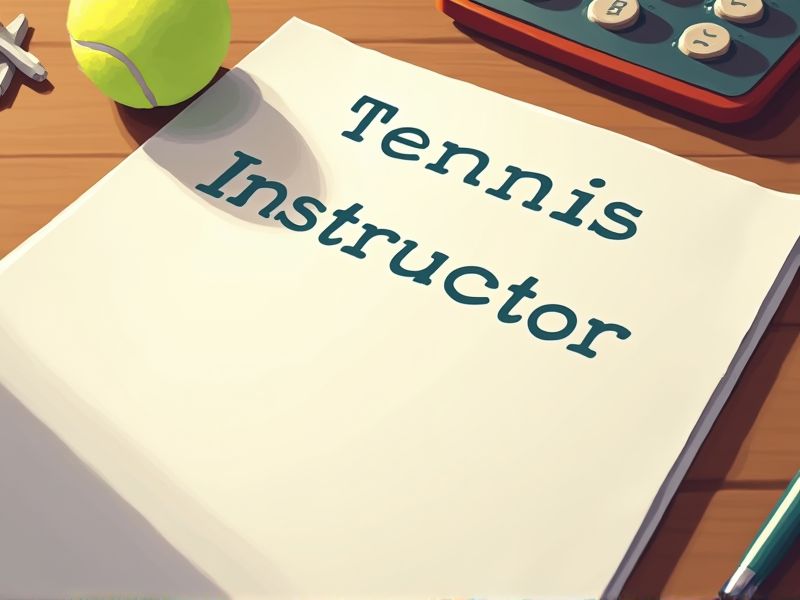
To establish credibility and ensure effective teaching, tennis instructors must possess certain certifications. These certifications often cover essential skills such as technique analysis, injury prevention, and lesson structuring. Having these credentials not only validates an instructor's expertise but also provides students with assurance of quality training. Here are some important certifications you may need as a tennis instructor.
USPTA Certification
The USPTA Certification ensures that a tennis instructor meets the industry's professional standards, leading to improved coaching quality. Holding a certification provides credibility, increasing trust and confidence among clients and employers. Through the certification process, instructors gain access to ongoing education and resources, enhancing their teaching skills. Certified instructors often have better career opportunities, as many clubs and organizations prefer or require this qualification.
PTR Certification
The PTR Certification ensures that tennis instructors have received standardized training, which enhances the quality of coaching. Certification provides a credential that can increase an instructor's job prospects and earning potential. Tennis facilities often require PTR-certified professionals to maintain a high standard of instruction and safety. Certification also equips instructors with the latest teaching techniques and methodologies, improving player performance and satisfaction.
ITF Coaching Certification
The ITF Coaching Certification ensures that tennis instructors have a standardized level of knowledge and skills necessary to teach effectively, increasing the quality of coaching in the sport. By obtaining this certification, instructors gain credibility and trust from players and parents, as it represents adherence to an internationally recognized set of guidelines. Certification provides ongoing education opportunities, enabling coaches to stay updated with the latest techniques and strategies in tennis. This structured development aids in improving player performance and advancing all levels of tennis participation.
USA Tennis Instructing Certification
A USA Tennis Instructing Certification ensures that tennis instructors possess a standardized level of training and expertise, which boosts credibility with potential students. It helps instructors stay updated with the latest coaching methodologies and techniques as industry standards evolve. Certified instructors are more likely to adhere to best practices that enhance player safety and improve skill development. The certification often leads to increased job opportunities and earning potential within clubs and training facilities.
CPR Certification
Tennis instructors often work with individuals in physically demanding environments, increasing the risk of sudden health emergencies like cardiac arrest on the court. Having CPR certification equips instructors with essential life-saving skills, enabling them to provide immediate assistance in critical situations. This training boosts the confidence of both the instructor and participants, knowing there is a first responder present. CPR certification may also be a mandatory requirement in many athletic facilities and insurance policies, ensuring a safer environment for all involved.
First Aid Certification
A tennis instructor with First Aid Certification is equipped to handle injuries that might occur on the court, ensuring prompt and effective response. Possessing this certification can enhance the instructor's reputation, increasing parental trust in lessons for young players. With knowledge of first aid, instructors can reduce the impact of injuries, minimizing downtime for athletes. Tennis facilities often require certified staff, making such certification necessary for employment.
NSCA Certified Strength and Conditioning Specialist (CSCS)
Obtaining the NSCA Certified Strength and Conditioning Specialist (CSCS) credential ensures a tennis instructor possesses scientific knowledge about proper strength training and conditioning techniques tailored for athletes. This certification leads to improved player performance by designing effective training programs that enhance agility, speed, and endurance specific to tennis. CSCS certification ensures instructors understand injury prevention and recovery strategies, contributing to the overall longevity and health of tennis players. The professional credibility gained through CSCS certification can result in increased trust and opportunities within the sports and fitness industry for the tennis instructor.
Child and Youth Coaching Certification
Child and Youth Coaching Certification equips tennis instructors with age-appropriate techniques, enhancing young athletes' skill development. It provides instructors with insights into child psychology, fostering a supportive environment essential for youth engagement. Safety protocols included in the certification ensure that coaches create a physically and emotionally safe space for young players. The certification boosts parents' trust, leading to increased enrollment in tennis programs for their children.
Sports Nutrition Certification
A Sports Nutrition Certification equips a tennis instructor with the necessary knowledge to optimize athletes' performance through tailored dietary plans. Understanding nutrition helps in recognizing how food intake influences energy levels, recovery, and overall health, which directly impacts tennis training and competition results. Instructors can use this expertise to educate players on meal timing and macronutrient balance, crucial for sustained energy and enhanced on-court performance. Gaining certification increases a coach's credibility and equips them with tools to address specific dietary needs and promote healthier athletic lifestyles.
Sports Psychology Certification
A sports psychology certification equips a tennis instructor with tools to enhance players' mental resilience, crucial for managing high-pressure situations during matches. Understanding psychological aspects can improve communication skills, fostering a better coach-player relationship. Knowledge in sports psychology helps tailor training programs to meet individual mental and emotional needs, optimizing overall performance. This specialized training can differentiate a coach in a competitive market, potentially leading to more coaching opportunities.
Summary
When you acquire certifications as a tennis instructor, your credibility with students and potential clients tends to increase. This enhanced credibility often leads to a broader client base and more teaching opportunities. Certified instructors might also experience improved teaching methods, contributing to student success and retention. Consequently, your career growth and earning potential in the tennis industry can rise.
